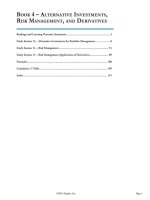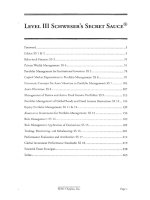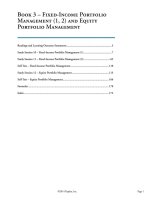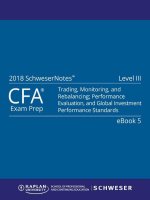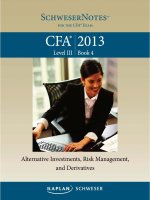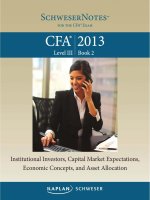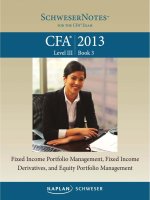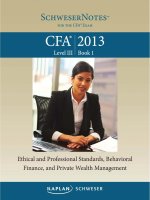2019 CFA level 3 qbank reading 23 liability driven and index based strategies answers
Bạn đang xem bản rút gọn của tài liệu. Xem và tải ngay bản đầy đủ của tài liệu tại đây (565.54 KB, 9 trang )
Question #1 of 12
Since the great recession of 2007-2008, rms have had a di cult time achieving actuarial
estimated targeted returns in their xed income portfolios for their de ned bene t plans. As a
result, many de ned bene t plans have turned to investing in more risky investments, like
stocks and longer maturity bonds, Reliant Manufacturing is no di erent. Reliant has hired a
well-respected actuarial rm to close the duration gap between their assets and liabilities by
using Treasury bond futures contracts.
12.25. The BPV of the liability is estimated at $612,500.
.in
Assume Reliant's DB pension plan has a PBO of $500 million, with an e ective duration of
en
tre
The plan assets of $600 million are invested 70% equities and 30% xed income. The manager
currently holds a laddered bond portfolio of 2 and 3 year Treasuries and longer term
investment grade corporate bonds. The duration of the bond portfolio is approximately 5.0 and
the BPV of the plan assets are approximately $250,000. The actuarial rm estimates that Reliant
bo
ok
c
has a duration gap of $362,500 and the Treasury Bond Futures contract is based on $100,000
par. The CTD bond has a BPV of 125, duration of 13 and a conversion factor of .98. The BPV of
each futures contract is 127.55 BPV.
Assuming the actuarial rm's PM has no view on interest rates and decides to construct a 100%
m
hedge to eliminate the duration gap, the number of futures contracts that the PM will purchase
.o
to increase the asset duration is closest to:
w
w
A) 2,678.
B) 2,900.
w
C) 2,842.
Explanation
100% hedge = ($612,500 - $250,000) / 127.55 BPV Futures = 2,842 contracts to buy.
Note: You can only buy or sell entire futures contracts; you can't buy or sell fractions of
contracts. You must round the number of contracts.
(Study Session 11, Module 23.3, LOS 23.d)
Related Material
SchweserNotes - Book 3
Question #2 of 12
Smart Beta in xed income investing has evolved from equity investing and uses simple,
transparent, rules-based strategies to help make investment decisions. Basically, smart beta
attempts to identify strategies that can generate excess returns. Many xed-income investors
use smart beta to address systematic biases such as the "Bums problem".
The Bums problem in regard to Fixed Income Investing is:
A) often a positive correlation between the amount of bonds issued and credit
worthiness of the issuer.
.in
B) a less credit worthy issuer that gets increasing weightings in a value weighted index
as they issue more bonds.
en
tre
C) a more creditworthy issuer that tends to become an increasing percentage of a
bond index.
Explanation
bo
ok
c
The Bums problem involves a less credit worthy issuer that gains increasing weight in a value
weighted index by issuing an increasing amount of debt.
(Study Session 11, Module 23.5, LOS 23.h)
Related Material
.o
m
SchweserNotes - Book 3
w
w
Question #3 of 12
w
Hans Wilsdarf specializes in risk management strategies with Bezel Limited and has been hired
to defease $5 million of xed income liabilities for a local municipality. The bonds under
consideration are putable in May of 2021, pay interest semi-annually of 4.25%, and mature in
2030. Based on the bond's underlying structure, the amount of cash outlay is known but the
timing of cash outlay is unknown.
These liabilities would be classi ed as:
A) Type II.
B) Type I.
C) Type IV.
Explanation
Type II liabilities is the correct answer. Type II liabilities have known amounts, but the timing
of those payments is not certain. Examples of Type II liabilities include callable and putable
bonds.
(Study Session 11, Module 23.1, LOS 23.a)
Related Material
SchweserNotes - Book 3
Question #4 of 12
.in
Kirsten Smith is a fund manager with Balco Fixed Income Consulting and specializes in sector
her allocation between Treasuries and corporates.
Smith would execute the following trading strategy:
en
tre
and quality enhanced indexing. Smith is expecting signi cant spread widening and is altering
bo
ok
c
A) Smith would decrease her allocation to Treasuries over corporates.
B) Smith would increase her allocation to Treasuries over corporates.
C) Smith would increase her allocation to AAA corporate bonds.
Explanation
.o
m
Smith would increase her allocation to Treasuries over corporate bonds when signi cant
spread widening is anticipated. Smith would increase her allocation to corporates over
Treasuries if she expected signi cant spread narrowing.
w
w
(Study Session 11, Module 23.5, LOS 23.g)
Related Material
w
SchweserNotes - Book 3
Question #5 of 12
In using Treasury futures for immunization, a possible source of underperformance with this
hedging strategy is likely because:
A) a less accurate estimate of futures BPV could adjust for accrued interest discounted
at short-term rates.
B) futures BPV is calculated using an estimated CTD allowable security divided by its
conversion factor. The estimated CTD security values can change the futures
d
i
d h
C) actuarial assumptions are frequently very unreliable.
Explanation
Futures base BPV calculations are based on an assumed CTD bond. That bond can change,
changing the futures duration and the BPV estimates. A more accurate estimate of futures
BPV could adjust for accrued interest. Actuarial assumptions are frequently reliable.
(Study Session 11, Module 23.4, LOS 23.e)
Related Material
en
tre
.in
SchweserNotes - Book 3
w
w
w
.o
m
bo
ok
c
Question #6 of 12
Randolph David is the lead Fixed Income portfolio manager at a rm that specializes in
Environmental, Social and Governance (ESG) investing. His rm has just recently launched a
bond fund that seeks to provide as high a level of current income as is consistent with
preservation of capital through investment in bonds and other debt securities. The fund also
focuses on issuers that meet the rm's comprehensive Responsible Investing (RI) and nancial
valuation analysis. The Bond fund is benchmarked to the Bloomberg Barclays U.S. Aggregate
18.43
AA
4.19
A
15.34
BBB
42.62
BB
7.11
B
1.89
en
tre
AAA
.in
Bond Index, current credit quality breakdown of the benchmark is shown below.
bo
ok
c
NOT RATED 10.42
Randolph and his analyst team nd that the benchmark has a large percentage of bonds that
are rated BB that do not meet the rm's comprehensive Responsible Investing (RI) analysis
because they are primarily composed of high carbon emission Industries.
Randolph is worried about reducing tracking error for his portfolio while also meeting the rm's
w
w
B) Pure Indexing.
.o
A) Active Management.
m
stringent ESG investing parameters. Randolph should recommend what investment strategy:
C) Cell matching.
w
Explanation
Randolph should use a form of cell matching to incorporate ESG investing parameters, while
also matching the primary risk factor (duration) of the benchmark to minimize tracking error.
Pure indexing is incorrect because it would be too costly and it would purchase securities
that don't pass the rm's ESG parameters.
Active management is incorrect because it involves taking positions in primary risk factors
that deviate from the benchmark, which would result in higher tracking error.
(Study Session 11, Module 23.5, LOS 23.f)
Related Material
SchweserNotes - Book 3
Question #7 of 12
Caitlin Randolph is a xed income consultant for a large endowment that has a $15 million
single liability that is due in 8 years. The Board of Directors for the endowment has requested
that Caitlin immunize the payment and it is not possible to use zero-coupon bonds in this
situation. The Board is requesting Caitlin to consider two portfolios of government securities
for consideration that were selected by the endowment's investment committee.
The consultant is instructed to initially select the portfolio that will minimize the risk of the
.in
portfolio over the 8 year period.
Portfolio 2
en
tre
Portfolio 1
4.2%
Macaulay
duration
7.99
8.02
Convexity
94.16
123.57
bo
ok
c
Yield of Portfolio 4.0%
Indicate the portfolio that Caitlin should recommend:
A) Portfolio 1.
m
B) Neither Portfolio 1 or 2.
w
w
Explanation
.o
C) Portfolio 2.
w
Caitlin should select portfolio 1. There is a minimal yield di erence, 4.2% vs 4% for the two
portfolios and both portfolios have durations approximately equal to 8 years. Since the yield
and duration di erences are minimal, Caitlin should select the portfolio that has the lowest
convexity. By selecting Portfolio 1, Caitlin is minimizing the structural risk of the
immunization strategy from non-parallel and twisting changes in the yield curve.
(Study Session 11, Module 23.1, LOS 23.b)
Related Material
SchweserNotes - Book 3
Question #8 of 12
Randolph Lyndsey is a de ned bene t plan consultant and is advising pension managers to be
cautious of interest rate risk in their portfolios from expected increases in rates by the Fed.
To lower the duration of their portfolios because of Randolph's rising interest rate forecast:
A) A receive- xed swap has negative duration so this will decrease the overall
portfolio’s duration.
B) A portfolio manager can enter into a receive- oating swap to lower the portfolio’s
duration.
C) A portfolio manager can enter into a receive- xed swap to lower the portfolio’s
.in
duration.
Explanation
(Study Session 11, Module 23.3, LOS 23.d)
SchweserNotes - Book 3
m
Question #9 of 12
bo
ok
c
Related Material
en
tre
A receive- xed swap has positive duration and will increase the portfolio's duration. To lower
the portfolio's duration, the PM should enter into a receive- oating swap.
.o
A wealth manager purchases equal positions in the 2018 through 2020 xed maturity corporate
bonds.
w
w
bond ETFs to create a laddered portfolio that approximately replicates holding the individual
The advantages of purchasing the ETFs over the purchase of the individual bonds include
w
increased:
A) ability for tax-loss harvesting strategies in taxable accounts.
B) liquidity, price stability in earlier maturing ETF’s, and increased convexity.
C) liquidity and decreased convexity compared to holding a bullet structure portfolio.
Explanation
The advantages of purchasing the ETFs over the purchase of individual bonds include
increased liquidity, price stability in maturing ETFs, and increased convexity. ETFs do not o er
an increased ability for tax-loss harvesting strategies but are e ective for taxable accounts
because of the tax-advantages that result from the structure of ETFs.
(Study Session 11, Module 23.6, LOS 23.i)
Related Material
SchweserNotes - Book 3
Question #10 of 12
Noah Randolph, Chief Risk O cer for TREND Corp, has determined that the most e cient way
to immunize against interest-rate risk on a known single liability is to purchase a government
issued zero-coupon bond that matches the term of the liability. However, Noah decides not to
follow this method when he has to immunize TREND's upcoming liability. The most likely
.in
reason that Noah did not immunize the single liability with a government zero is:
decrease over the next year.
en
tre
A) Noah was worried about reinvestment risk because rates were expected to
B) Noah wanted to use a more complex strategy to achieve superior returns.
bo
ok
c
C) Noah could not nd a zero-coupon bond available to match the liability.
Explanation
Generally, zero-coupon bonds are often not available for the exact time period of the liability.
Also, there is no reinvestment risk with zero-coupon bonds because there are no cash ows
to reinvest.
.o
Related Material
m
(Study Session 11, Module 23.1, LOS 23.b)
w
w
w
SchweserNotes - Book 3
Question #11 of 12
Liz Ruzzboy is a De ned Bene ts Pension fund manager for a large multinational in Australia.
Her rm was recently acquired by a U.S. based corporation and the pension will now be
operating under U.S. tax code. Under the U.S. tax code, Liz is concerned about interest rate risk
because:
A) Changes in the funding status ow through the balance sheet and can lower rm
assets thus decreasing asset based nancial ratios.
B) Changes in the funding status ow through the income statement and can a ect
EPS.
C) Liz is not worried about interest rate risk because it can be hedged away with
derivatives.
Explanation
Under the U.S. tax code, changes in the funding status ow through the income statement
and can a ect EPS.
Interest rate risk can be lowered by hedging with derivatives but it is often expensive and not
likely perfectly hedged.
(Study Session 11, Module 23.3, LOS 23.d)
Related Material
en
tre
.in
SchweserNotes - Book 3
Question #12 of 12
Randy Kosso , CFO of Johnson Systems, has decided to implement an immunization strategy
bo
ok
c
for multiple upcoming liabilities. Kosso reaches out to the rm's lead xed income trader to
create the portfolio.
What information must the trader have to create a successful immunized portfolio?
m
A) The trader would need both the money duration and the convexity of the
.o
underlying assets and liabilities.
B) The trader would need to have the cash ow yield and Macaulay duration of the
w
w
underlying liabilities.
C) The trader would need the money duration and the Macaulay duration of the
w
underlying liabilities and the assets.
Explanation
There are only two requirements that are needed to achieve immunization for multiple
liabilities. The money duration (BPV) of the assets and the liabilities must match and the
convexity of the assets must be larger than the convexity of the liabilities.
(Study Session 11, Module 23.1, LOS 23.c)
Related Material
SchweserNotes - Book 3
